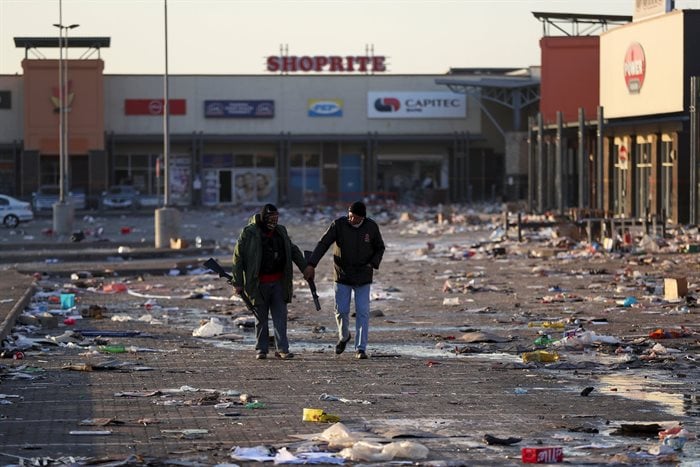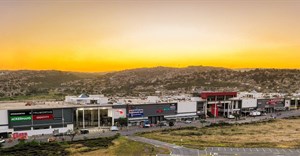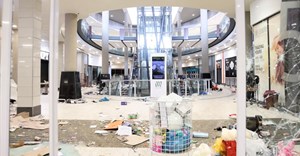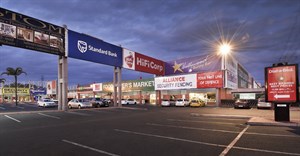Trending
Elections 2024
Jobs
- Intermediate C# Developer Centurion
- Printing Sales Account Executive Johannesburg
- Sales Manager Johannesburg
- Mid/Senior Graphic Designer Kloof
- Coordinator - Marketing and Communications Johannesburg
- Social Media Content Creator West Rand
- Google Paid Media Specialist Johannesburg
- Digital AI Intern Cape Town
- Senior Software Developer Cape Town
- Senior Copywriter Johannesburg
Silver lining from unrest, Covid-19 for businesses that can reimagine sustainable future growth

Against this backdrop, it may be difficult to see any possible positive consequences of the looting. The challenges are immense in terms of rebuilding retail and commercial property that was damaged or destroyed. That said, however, for those who are willing to view the unrest through a slightly more optimistic lens, there are a few potential silver linings.
Greater demand on the back of limited supply options
For one, many of the businesses that were not forced to completely stop trading after the unrest have experienced a significant increase in the amount and value of trade as demand has risen on the back of limited supply options. There are also opportunities for businesses that have maintained or increased their trade levels to acquire damaged buildings from other businesses that have made the decision to cease operations. In most cases, these damaged buildings are available at very compelling prices, and there is the potential to reconfigure or repurpose these assets to accommodate expanding business plans and opportunities.
Of course, this will be of very little comfort to those businesses that were forced to close shop because of the damage to their premises. However, the return to relatively stable consumer activity is also a positive signal regarding the viability of rebuilding those damaged businesses. Furthermore, it may be possible to leverage the unrest as a catalyst for change, and re-enter the market with a new business plan, a reconfigured operating model, higher levels of business resilience, and expanded scope for sustainable long-term growth and profitability.
And the opportunities for reinvention post-unrest and looting aren’t limited to retail businesses. Commercial and office buildings impacted by the unrest now also have a unique opportunity to leverage the capital injection provided by insurance pay-outs to implement the structural changes that were already required on the back of Covid-19 and the global shift to working from home.
Still some hurdles to overcome
Unfortunately, there are still some hurdles that need to be overcome before business owners will be fully able to give effect to this renewed vision for their operations. The widespread steel shortages currently plaguing the country are arguably the most significant challenge to those wanting to take advantage of the opportunity to rebuild their physical premises. While the shortages have been driven by increased global post-Covid-19 demand, which is good news for SA’s local steel manufacturers, the likely resultant time lag in being able to access steel for construction will undoubtedly require some innovative thinking by businesses, and their construction and development partners.
Unfortunately, that out-of-the-box thinking won’t be able to include importing the steel needed to physically rebuild businesses, as the shipping bottlenecks and worldwide shortage of containers are likely to continue slowing down imports dramatically for several years to come. However, these challenges are also a pleasing pre-cursor to a much more resilient and sustainable SA steel industry in the future, so while the short-term construction challenges are an annoyance, it’s worth keeping the longer-term benefits for all participants in the steel value chain in mind.
Important role of banks and financiers
While financial institutions can do little to help address these physical constraints to rebuilding in Gauteng and KwaZulu-Natal, banks and financiers have an important role to play in helping to catalyse, and support, such rebuilding in whatever way they can. One of the most important and valuable ways banks can do that is by demonstrating that they fully understand the diverse challenges facing businesses, whether those relate to physically rebuilding, reimagining their operating models, or acquiring additional premises for expansion purposes. Within the property finance realm in particular, empathy and the ability to see the world through the eyes of clients are more important than ever before.
For FNB, this more empathetic approach has resulted in a far more flexible and agile approach. Our credit criteria have been overhauled to be more reflective of the changed property environment and the unique circumstances of many of our clients. Our funding and repayment structures are tailored on an individual client basis, and we are highly active in brokering adaptive client relationships with their municipalities and other regulatory bodies to secure faster planning approvals and generous concessions in order to kick-start the rebuilding process.
Turning short-term tragedy into long-term triumph
Ultimately, when one looks at the commercial and retail property trends for several years leading up to Covid-19, and accelerated through the period of the pandemic, it’s clear that a fundamental reset was becoming increasingly necessary to ensure its future sustainability. While nobody would have wished that reset to come in the form of violent mass action, the reality is that it has. Now it is up to the stakeholders in the affected sectors, including the retail and commercial industries, property development and even property finance, to take decisive action and turn short-term tragedy into long-term triumph. It probably won’t be quick or easy; but with will and determination, it’s definitely possible.

















